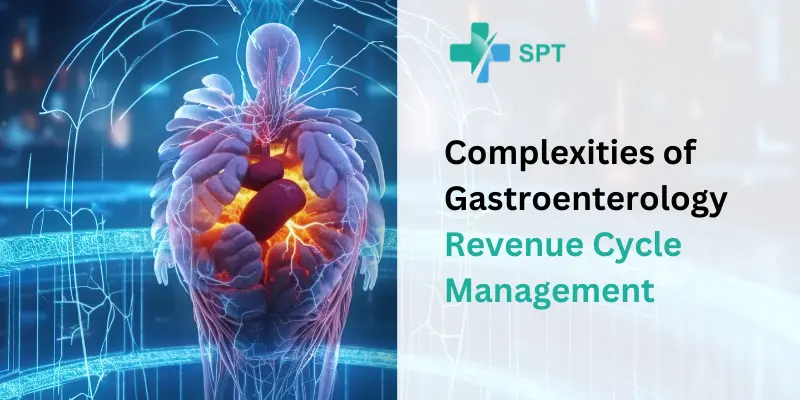Managing the cash flow in a gastro clinic can seem as complex as the digestive system itself. However, with a solid strategy for gastroenterology revenue cycle management, you can make it not only manageable but also effective. It’s about guiding a patient’s bill from the initial appointment all the way through to the final payment with as little turbulence as possible.
Keep your practice financially fit by having a grip on this process, and ensure that your clinic not only survives but thrives. For that, there are certain solutions to apply when it comes to resolving the complexities of gastroenterology revenue cycle management. Stick around as we sort out this critical process for you.
Understand Gastroenterology Medical Billing First
Recall a moment when you go to a gastroenterology clinic – maybe for something like a tummy ache that’s been going on too long. The doctor does their thing, maybe runs some tests or gives you some medicine, and then you’re on your way. But on the other side, the work has just begun for the clinic.
What they have to do next is gastroenterology medical billing, either by doing the hectic process by themselves or availing legit gastroenterology billing services for the best help.
It’s simply a fancy way of saying “sending the bill for your visit.” The team at the clinic pops all the details about your visit into a system: what tests they did, what medicine they gave you, any procedures, and so on. They do that in a special coding language that insurance companies understand.
Once they’ve got all the details in, they send the bill off to the insurance company so that they can get paid for helping you out. The insurance company checks out the bill, makes sure everything is legit, and then sends the payment back to your doctor’s office.
7 Complexities of Gastroenterology Revenue Cycle Management
It’s time to discuss the main complexities of gastroenterology revenue cycle management faces most of the time. We are highlighting the core complexities and their solutions side by side by keeping the medical coverage database in mind.
1. Accurate and Efficient Patient Scheduling
Patient scheduling, particularly in a specialty like gastroenterology, requires careful planning. Overbooking can lead to long patient waiting times, causing patient frustration and dissatisfaction. On the other hand, underbooking can mean wasted resources and potential revenue loss.
Solution:
Adopting a scheduling software system that takes into account the varying lengths of appointments according to procedure type, patient history, and doctor can significantly increase scheduling efficiency. It confirms maximum utilization of resources and improves patient satisfaction through reduced waiting time.
2. Comprehensive Eligibility and Benefits Verification
Confirming patient insurance coverage involves going through complex policy details, which is crucial to doing the best denial management and avoiding any unnecessary claim denials. Incorrect verification can delay reimbursement and burden patients with unforeseen costs, affecting the financial health and reputation of the practice.
Solution:
The best solution to resolve this complexity of gastroenterology revenue cycle management is to integrate real-time eligibility verification software directly with insurance providers to facilitate the process. It guarantees accurate, up-to-date coverage information before services are rendered, reducing claim denials and improving cash flow.
3. Correct Medical Coding
In gastroenterology, accurate medical coding is critical. Every diagnosis, treatment, and procedure must match its correct medical code. Mistakes can lead to claim rejections and payment delays, straining the financial well-being of the practice. The complexity of coding grows as medical advancements introduce new procedures and treatments.
Solution:
Now regular training and certification in the latest medical coding standards (e.g., ICD-10, CPT codes) for staff can help maintain accuracy. Additionally, employing advanced medical coding software that checks for errors in real-time can prevent mistakes before claims are submitted, confirming smoother revenue flow.
4. Timely Claim Submission
There is no doubt that submitting insurance claims within payers’ deadlines is crucial. No one can deny that delays in submitting claims can lead to missed deadlines, resulting in rejected claims and financial losses for the gastroenterology practice. Managing the sheer volume of paperwork and ensuring accuracy can be overwhelming and time-consuming.
Solution:
To this, if you automate the claim submission process with specialized software then it can significantly reduce manual workload and minimize errors. This technology can track claim status in real-time, ensure adherence to payer deadlines, and prompt necessary follow-ups, thus expediting payment cycles.
5. Handling Denied and Rejected Claims
One of the big complexities of gastroenterology revenue cycle management is when claims may be rejected due to errors like incorrect codes or eligibility issues, negatively impacting a gastroenterology practice’s revenue. So denials can be costly and time-consuming to correct and resubmit. This process often distracts from patient care and potentially hampers cash flow.
Solution:
If medical practitioners adopt robust denial management software can track and analyze claim denials, ensuring fast and accurate follow-up. This system aids in detecting patterns, identifying recurring issues, and preventing future denials, thus optimizing the practice’s revenue cycle.
6. Efficient Patient Billing and Collections Process
Having a clear, timely, and organized billing process is strong in a gastroenterology practice. Because a complicated or lackluster billing process can lead to confusion for patients, increased payment delays, or uncollected payments. Thus, this inefficiency ultimately impacts the revenue stream.
Solution:
If medical service providers implement comprehensive medical billing software then they can simplify this process by providing clear, detailed invoices and enabling varied payment options (like online payments). Additionally, employing a dedicated collections team to personalize follow-up on overdue payments can enhance collections, thereby improving the practice’s financial health.
7. Compliance With Regulatory Standards and Changes
Last but not least for gastroenterology practices, maintaining loyalty to HIPAA, MIPS, and other changing healthcare regulations is crucial. Failing to comply can lead to severe financial penalties, compromised patient privacy, and legal issues.
Solution:
The practice should engage in continuous education on new healthcare laws, such as updates to MIPS measures or changes in HIPAA rules. If you utilize compliance management software that provides real-time updates and compliance tracking, then it can guarantee that the practice meets all legal and industry standards, avoiding violations and their associated costs.
Overcome the Gastroenterology RCM Challenges
It’s evident that overcoming these main seven complexities of gastroenterology revenue cycle management is no small feat. However, by leveraging technology, continuous staff education, and compliance management software, practices can sort the challenges efficiently. Moreover, specialized services like those offered by SP Technologies can be game-changers, offering improved care for patients and assuring financial stability for practices. Ultimately, the goal is a seamless administrative flow, allowing practitioners to focus on their primary goal—exceptional patient care.
How Can SPT Billing Company Help You?
At SP Technologies you will find tons of solutions to resolve the complexities of gastroenterology revenue cycle management with a suite of tailored medical billing services designed to ensure financial health and improve patient care. With their expertise, they offer seamless claims submission, proper medical coding, and efficient account receivable management.
Medical practitioners will get simplified eligibility verification to minimize denials and optimize cash flow. Their advanced laboratory billing services and provider credentialing confirm that every aspect of the billing process is covered, leading to optimized revenue cycle management. The result? Gastroenterology practices can achieve a high claim acceptance rate, reduced days in Accounts Receivable (AR), and ultimately, increased revenue, allowing practitioners to focus on patient care.





